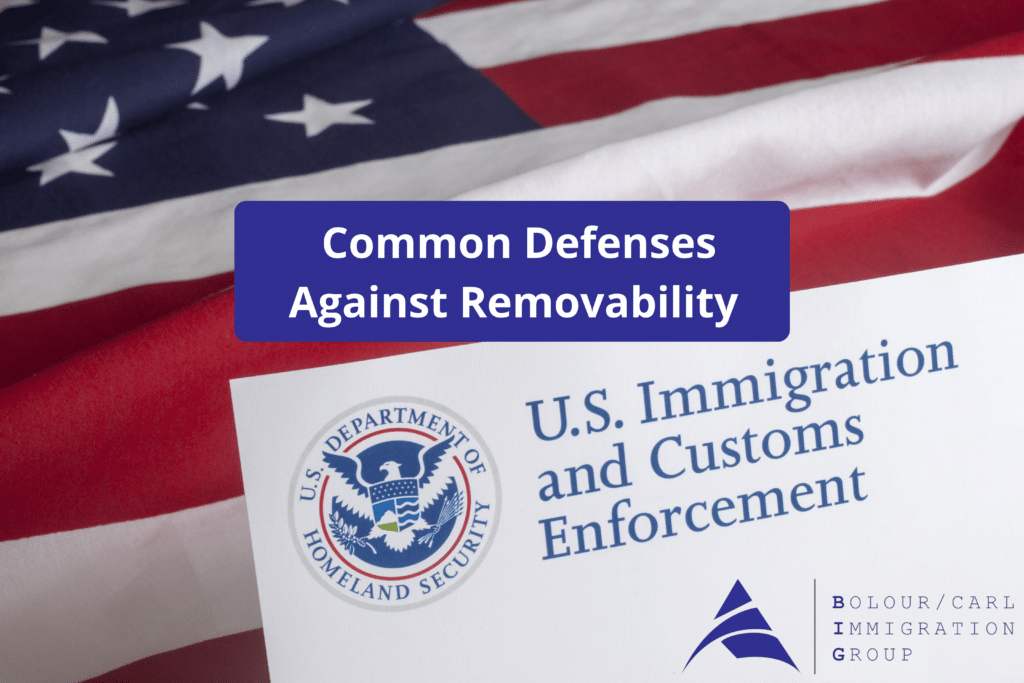
If you are facing deportation from the United States, there are steps you can take to mount a successful defense. Below is a look at some of the reasons that noncitizens are commonly ordered to be removed by immigration officials, along with five common deportation defenses that may allow you to remain in the country.
What is Deportation?
Deportation or removal refers to the forced departure of someone from the United States by immigration officials. Noncitizens who enter the country without documents or who overstay or violate the terms and conditions of their visa can be removed or placed in removal proceedings. Conditional permanent residents may face removal if the condition on which their green card was based no longer applies – such as when a noncitizen with a conditional green card based on marriage gets divorced. Even permanent residents can be removed if they meet certain grounds of deportability, including certain criminal activity, document fraud, marriage fraud, domestic abuse, or drug offenses.
Consult a Deportation Defense Attorney
Depending on your circumstances, you may have been placed in deportation proceedings or you may already have been ordered removed from the country by an immigration judge or officer. Contact a competent immigration attorney with expertise in deportation defense as early in the process as possible. Depending on your situation, there are strategies that an experienced deportation defense attorney can employ. Below is a brief look at some of the common defenses to deportation.
Cancellation of Removal
This form of relief from deportation is available at an immigration judge’s discretion to both non-permanent residents and permanent residents who can prove that they meet certain criteria. Non-permanent residents must show they have been continuously present in the United States for at least 10 years; that they are of good moral character; that they have not been convicted of certain crimes or violated certain laws; and that their removal from the United States would cause “exceptional and extremely unusual hardship” to their U.S. citizen or permanent resident spouse, child or parent.
If you are a legal permanent resident and you wish to employ this defense, the requirements are less stringent. To be eligible, you must show that you have been a lawful permanent resident for at least five years and continuously present in the United States for seven years, and that you have not been convicted of an aggravated felony.
How to Seek Aslyum in the U.S.A.
If you are in removal proceedings, you can request asylum as a defense against removal. To be granted asylum, you must meet certain criteria and show that you fear you will be persecuted if returned to your country of origin or that you were previously persecuted in your country for reasons related to your race, religion, nationality, political opinion or membership in a particular social group. Asylum applications must be filed within a year of last entry into the United States unless “extraordinary circumstances” can be established.
Withholding of Removal
If you are in deportation proceedings, you can also apply for withholding of removal if you can demonstrate that it is “more likely than not” that you will face persecution on a protected ground if you are returned to your country of origin. This is a higher bar than asylum, but unlike asylum, withholding of removal is not subject to a one-year filing deadline and may be available for applicants who have been convicted of certain crimes that might prevent them from being granted asylum.
Convention Against Torture (CAT)
To receive relief under the Convention against Torture defense, you must convince an immigration judge that you would more likely than not be tortured if returned to your country of origin. There are no bars to eligibility for applying for relief under CAT, but torture itself is a high bar, defined as “an extreme form of cruel and inhuman punishment” that causes “severe pain or suffering.”
Voluntary Departure
If you are in removal proceedings and are not eligible for other deportation defenses, your best bet may be to opt for voluntary departure, as it will allow you to avoid the consequences of having a removal order on your record. If you meet certain criteria, you can request permission to voluntarily leave the United States and return to your country of origin, where you can apply for a U.S. visa at a future date.
If you would like to speak to a deportation defense attorney, contact Bolour/Carl Immigration Group at 323-857-0034 or [email protected].




